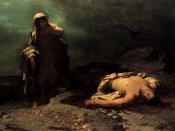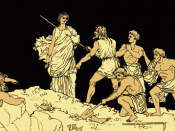Sophocles, the great Greek tragedian wrote the tragedy Antigone. In the play he uses universal themes, themes the audience knows and can relate to. These universal themes, loyalty to family, to state and to the God's cause the conflict resulting in tragedy.
The audience witnesses loyalty to family, through the strong emotions of the characters. Most of the characters in Antigone are blood related. Antigone deeply loves her brother and can't bear the thought of him not having a proper burial. She knows that burying him is strictly against Creon's orders, and is well aware of the consequences. Not able to live with her brother not getting a proper burial, and knowing the gods were on her side, she buries him. Haemon shows loyalty towards his father when Creon punishes his fiancé for giving her brother the proper burial rights. Heamon disagrees with his father, but does not strongly contest with his authority, even though he knows that his dad is killing his love.
Also, another example of loyalty toward family is when Eurydice kills herself when she finds her son has killed himself. She really loved her son and decided she couldn't live any longer without her son. As a result of loyalty to family, Antigone and Haemon die, Ismene loses her sister, and Creon loses his wife and son.
Loyalty to state, is another key universal theme in greek tragedy. Ismene shows her loyalty to state when he disagrees with her sister, Antigone, and decides that she doesn't ant to bury her brother. She knows that Creon issued a decree against his burial and is not willing to accept the punishment for burring him. This universal theme can go both ways. Loyalty or or the lack of. People in the greek audience would not have...


